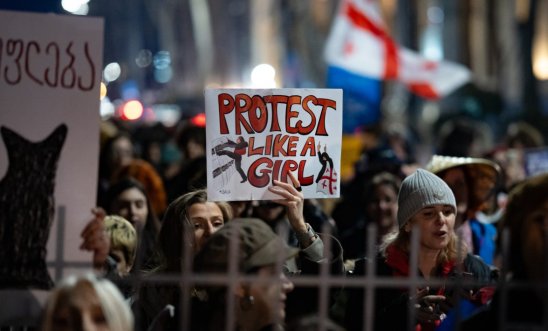
Press releases
Georgia: Women protesters targeted with escalating gender-based violence - new briefing

Sexist insults, threats of sexual violence and unlawful and degrading strip searches against women protesters
Opposition leader, Elene Khoshtaria, described being violently restrained by police, stripped and forced to lie naked on the floor during detention on 28 March 2025
Full undressing during searches violates Georgian and international human rights law
Amnesty witnessed police officers calling women protesters “whores” and threatening them and their family members
‘The Georgian authorities must immediately end all forms of gender-based reprisals and all unlawful use of force by law enforcement, investigate every allegation of abuse during the protests, and ensure accountability at all levels’ – Denis Krivosheev
Police in Georgia are increasingly using gender-based violence including sexist insults, threats of sexual violence and unlawful and degrading strip searches against women involved in protests as part of their larger campaign to intimidate and punish peaceful protestors, Amnesty International said in a new briefing published today.
Scenes of police brutality as well as violent physical attacks by unidentified individuals against peaceful protestors in Georgia have become disturbingly common since a powerful surge of pro-European, anti-government protests broke out in the country last year. Defying state repression, women protesters have become symbols of courage – but also the target of humiliation, abuse and psychological violence both by law enforcement officers and unidentified assistants.
Denis Krivosheev, Amnesty International’s Eastern Europe and Central Asia Deputy Director, said:
“The authorities may have hoped that by targeting women with threats of sexual violence, raids in their homes, unlawful strip searches, and arbitrary detention, they would crush the spirit of resistance, deter protesters from further gatherings, and silence them. Instead, women in Georgia have risen more boldly, denouncing the abuse, demanding justice and turning repressions into resistance and defiance.
“Unlawful, invasive and degrading strip searches in Georgia appear to be being weaponised to humiliate and intimidate protestors, especially women. This is a clear violation of both domestic and international law. The Georgian authorities must immediately end all forms of gender-based reprisals and all unlawful use of force by law enforcement, investigate every allegation of abuse during the protests, and ensure accountability at all levels.”
State violence and dehumanising strip searches
In recent months, Amnesty has documented numerous accounts of protesters subjected to sexist insults and threats of sexual violence, as well as humiliating strip searches. Such treatment appears to be increasingly targeting women protesters and affecting them disproportionately. These abuses not only violate Georgian law, which prohibits full undressing during searches, but also international human rights law and standards aimed at safeguarding human dignity and protecting people from gender-based violence.
Elene Khoshtaria, an opposition leader, described being violently restrained by police, stripped and forced to lie naked on the floor during detention on 28 March 2025. Despite her medical condition, officers denied her access to medication and restrooms even after she developed hypertension and suffered repeated vomiting.
Kristina Botkoveli, a co-founder of a protest Facebook group, was forced to strip naked in front of her elderly mother, in addition to being subjected to threats during a raid by police on their home on 1 February 2025. Kristina suffered a panic attack requiring emergency medical care.
Activist Nino Makharadze was detained during a peaceful protest on 13 January 2025 and subjected to an invasive strip search in a temporary detention centre. She was not allowed to inform her family and friends of her whereabouts and was only given access to her lawyer after the strip search. On 5 May, she reported being ambushed along with two women friends while returning home from a protest. An unknown assailant sprayed them with pepper spray and green paint while hurling insults. All three women reportedly sustained injuries, including chemical burns that required hospitalisation.
Verbal abuse and gendered intimidation
Sexist verbal abuse and threats of sexual violence against peaceful protesters are another common tactic used by law enforcement to intimidate and harass. During the 2 February 2025 demonstration near Tbilisi Mall, an Amnesty representative witnessed police officers calling women protesters “whores” and threatening them and their family members. Several women also reported being threatened with rape by masked officers.
Natia Dzidziguri, after being detained during protests on 19 November 2024, was forced to kneel in a police van surrounded by men while officers hurled sexually charged insults and gestures at her.
Mzia Amaghlobeli, a prominent journalist, was detained twice on 11 January 2025 during peaceful protests. On both occasions, she was subjected to sexist abuse by police, with the Batumi police chief allegedly spitting on her and threatening violence. The authorities have used the video in which Mzia Amaghlobeli smacks the police chief, following their verbal altercation, to prosecute her. They have ignored the video in which the police chief hurls sexist insults and verbal abuse at her. Mzia Amaghlobeli was remanded in custody following a swift hearing during which she faced further injustice in court when the judge refused to admit any of her defence evidence. The authorities to date have failed to investigate any police officers who allegedly ill-treated and otherwise abused her and other protesters. Not a single officer against whom serious allegations have been made, by Mzia Amaghlobeli or others, was suspended from their duties during the investigation.
A pattern of abuse
These reports are not isolated but appear to form a broader pattern of abuse by and impunity for Georgia’s law enforcement agencies. The humiliation, sexist rhetoric and physical violence directed at women protesters in Georgia align with broader efforts to intimidate those participating in ongoing protests. Local human rights defenders highlight that many victims of humiliating treatment by police, both women and men, remain silent out of fear or shame.
Such actions may constitute torture or other cruel, inhuman or degrading treatment or punishment and violate not only Georgia's Constitution and national legislation but also its obligations under international law, including the UN Convention Against Torture, and international standards.